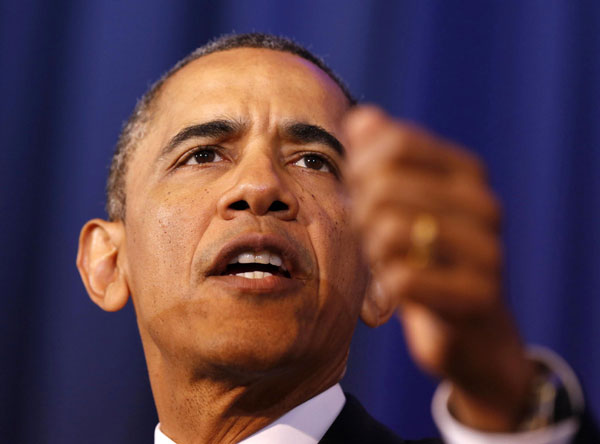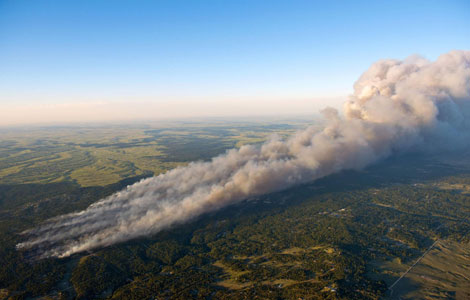
WASHINGTON - US President Barack Obama on Thursday sought to redefine his administration's counterterrorism policies, announcing new guidelines codifying controversial drone strikes against militant targets, while renewing his pledge to close the Guantanamo Bay military detention facility.
Obama made the announcement during a major policy speech delivered at the National Defense University, warning that "force alone cannot make us safe," and the country cannot use force everywhere that a radical ideology takes root.
 |
|
US President Barack Obama gestures as he speaks about his administration's counter-terrorism policy at the National Defense University at Fort McNair in Washington, May 23, 2013. [Photo/Agencies] |
"In the absence of a strategy that reduces the wellspring of extremism," said Obama. "A perpetual war - through drones or Special Forces or troop deployments - will prove self-defeating, and alter our country in troubling ways."
The most contentious issue on the president's table is the expanded use of drones to target militant targets in foreign countries. Obama said he has signed a Presidential Policy Guidance to codify guidelines, oversight and accountability of such strikes, in an effort to limit its use.
According to Obama, in Afghanistan, as US forces complete its drawdown by 2014, "we will no longer have the same need for force protection, and the progress we have made against core al-Qaeda will reduce the need for unmanned strikes."
Beyond Afghanistan, Obama said "our preference is always to detain, interrogate, and prosecute" individual terrorists, and lethal strikes were only carried out "when there are no other governments capable of effectively addressing the threat." He stressed before any strike is taken, there must be "near-certainty that no civilians will be killed or injured - the highest standard we can set."
According to the White House, lethal force will only be used to prevent or stop attacks against US persons, and only when capture is not feasible and no other reasonable alternatives exist to address the threat effectively.
One day before, the Obama administration formally admitted the killing of four American citizens in drone strikes since 2009, including radical cleric Anwar al-Awlaki.
CLOSURE OF GUANTANAMO
Addressing another controversial practice of the war on terror, Obama called on Congress to lift the restrictions on detainee transfers from Guantanamo, while asking the Department of Defense to designate a site in the United States to hold military commissions. He also will appoint an envoy to achieve the transfer of detainees to third countries, while lifting the moratorium on detainee transfers to Yemen.
"Where appropriate, we will bring terrorists to justice in our courts and military justice system," said Obama.
To demonstrate the difference of opinion on the matter, Obama was repeatedly interrupted in his speech by a protester who demanded the immediate closure of Guantanamo. Obama, who tried to act patiently, said he's "willing to cut the young lady who interrupted me some slack because it's worth being passionate about."
The president continued to highlight the difficulties of politics around the issue, but said history will "cast a harsh judgment on this aspect of our fight against terrorism, and those of us who fail to end it."
After Obama spoke, Defense Secretary Chuck Hagel immediately directed the Pentagon to begin implementing Obama's efforts to close the detention facility at Guantanamo.
The renewed pledge was applauded by those who fought to close Guantanamo. Morris Davis, a former Chief Prosecutor at Guantanamo Bay who left his post in 2007 over the interrogation tactics used there, said in a statement that with the announcement, "it seems years of rhetoric have finally turned into action." He described Guantanamo as costly, inefficient, morally wrong, and a stain on US human rights record.
Obama said the change in policy stemmed from the shifting and evolving threat of terrorism to the United States, as the core of al-Qaeda was on a path to defeat, al-Qaeda affiliates began to emerge, extremists take foothold in countries like Libya and Syria and home-grown radicalized individuals began to pose real threat.







